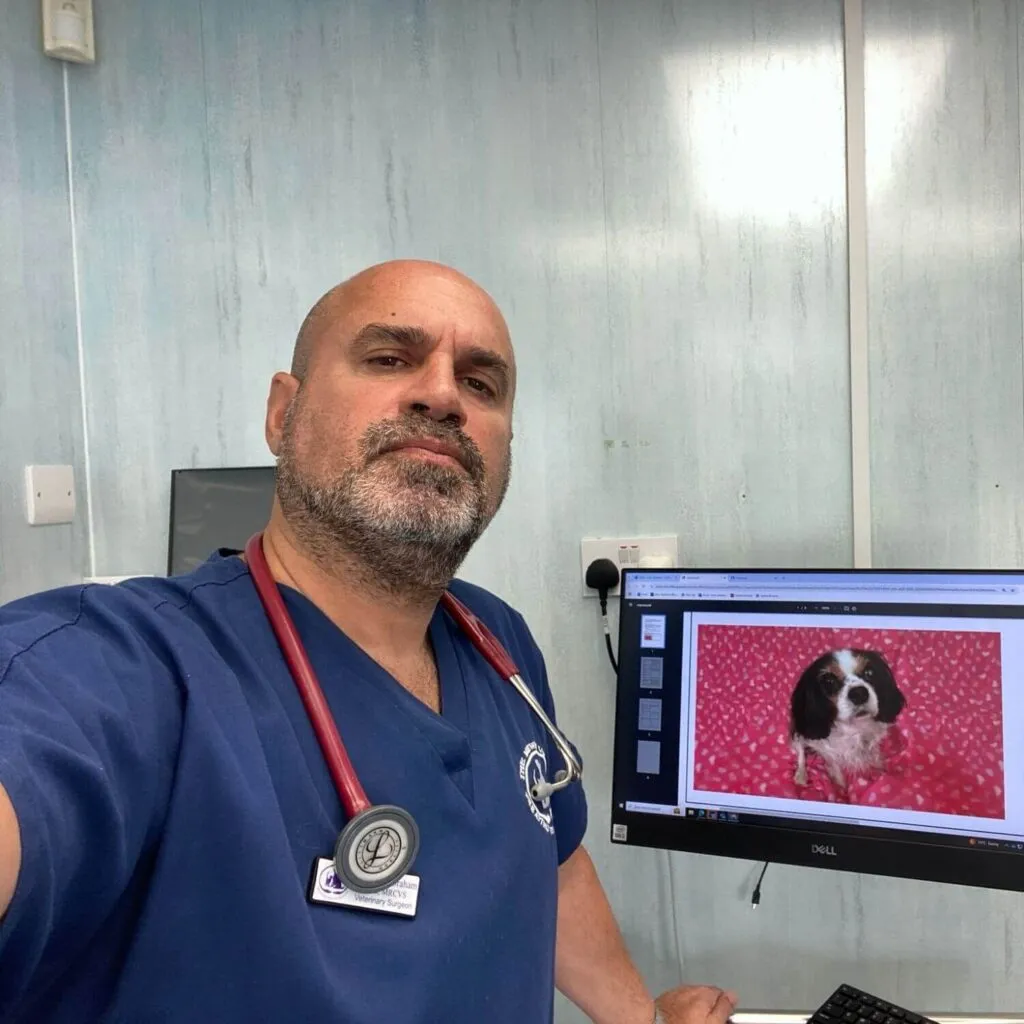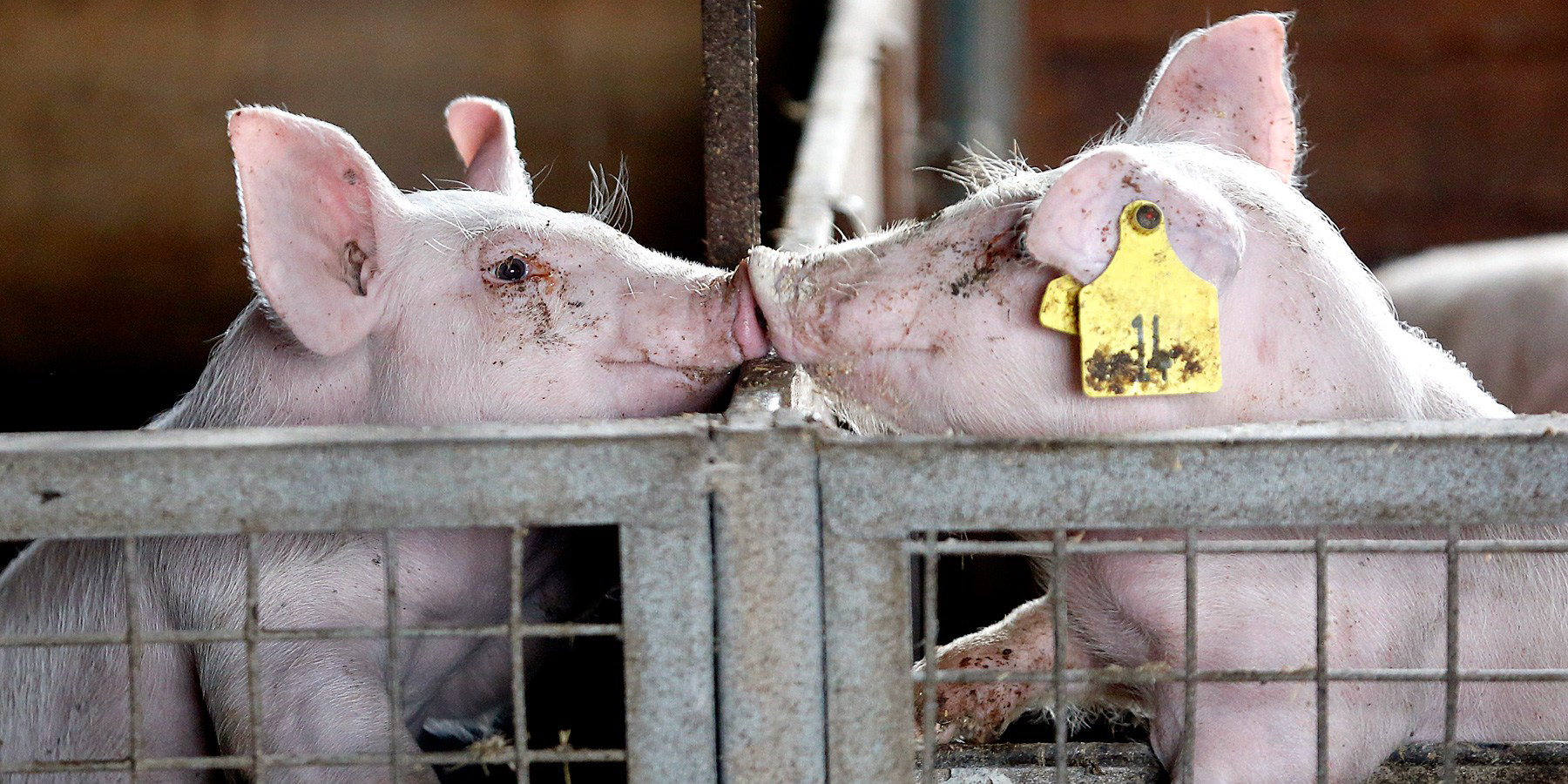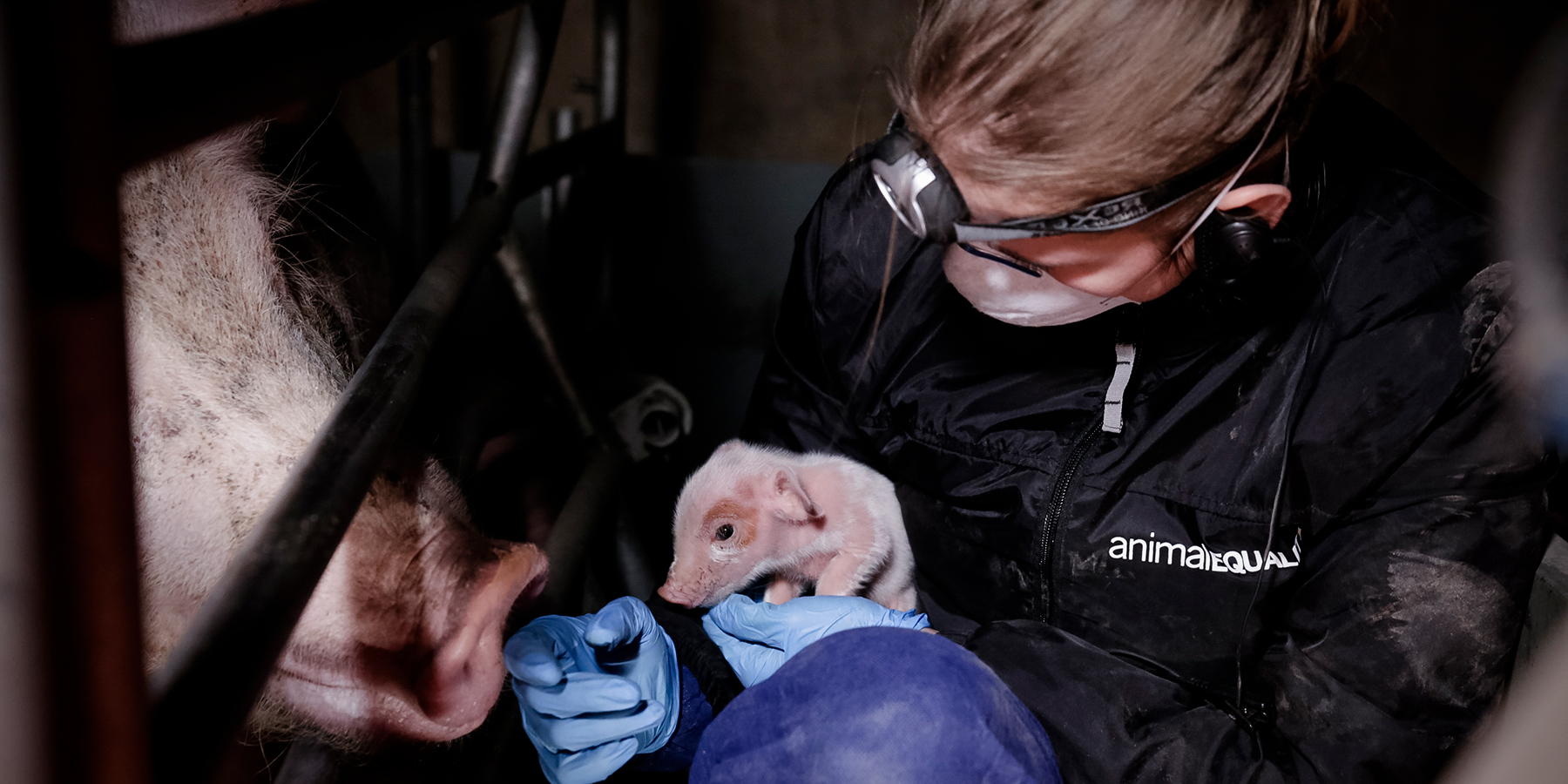Factory farming: everything you need to know
What comes to mind when you hear ‘factory farming’?
Sadly, it’s as grim as it sounds. Factory farming is an industrial method of raising animals purely for human consumption, where maximising production and minimising costs override any regard for life. In this system, animals are reduced to mere commodities on an assembly line, trapped in a cold, mechanised cycle that values profit above all else.
But what does this look like in practice? Built on the assumption that animals can be treated like products, factory farming confines them in cramped cages or pens, robbing them of any natural behaviour or basic comfort. The result is a life of misery and deprivation for millions of animals.
In this article, we uncover the grim reality of factory farming and everything you need to know about this industry.
- Factory farming in the UK: living conditions
- Factory farmed chickens & hens
- Factory farmed cows
- Factory farmed pigs
- Factory farmed fish
- Factory farming in the UK: regulations
- How can you help
The animals in the UK who are currently factory-farmed include cows, pigs, chickens, hens and fish.
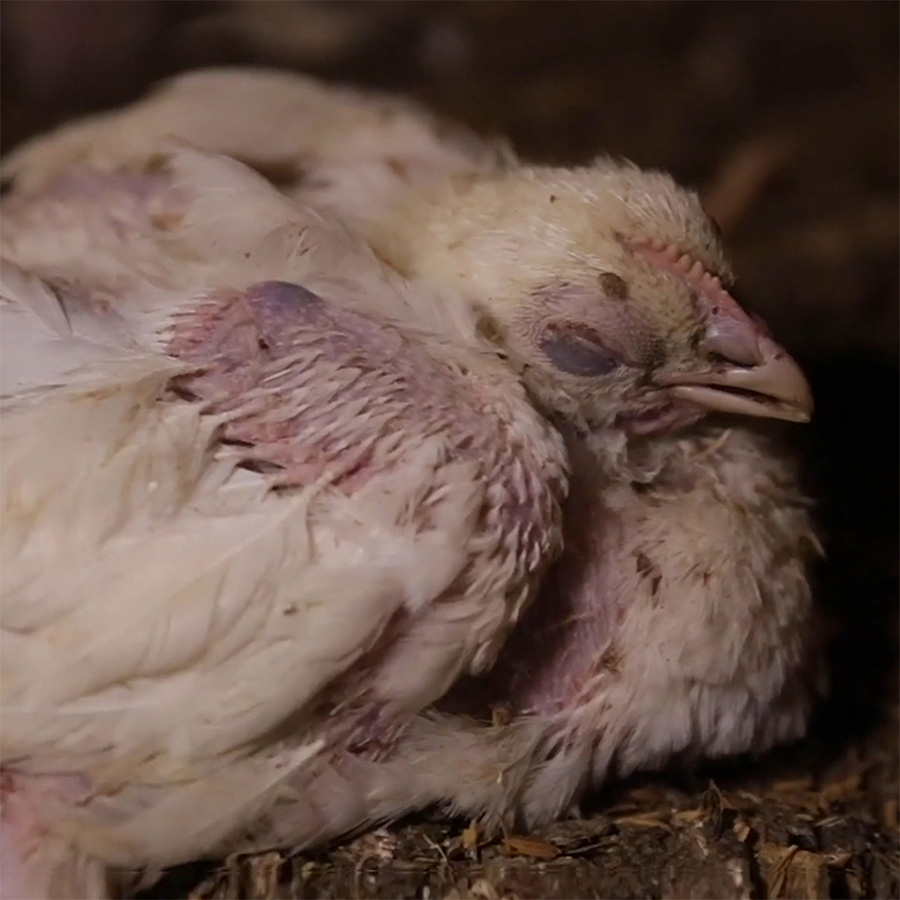
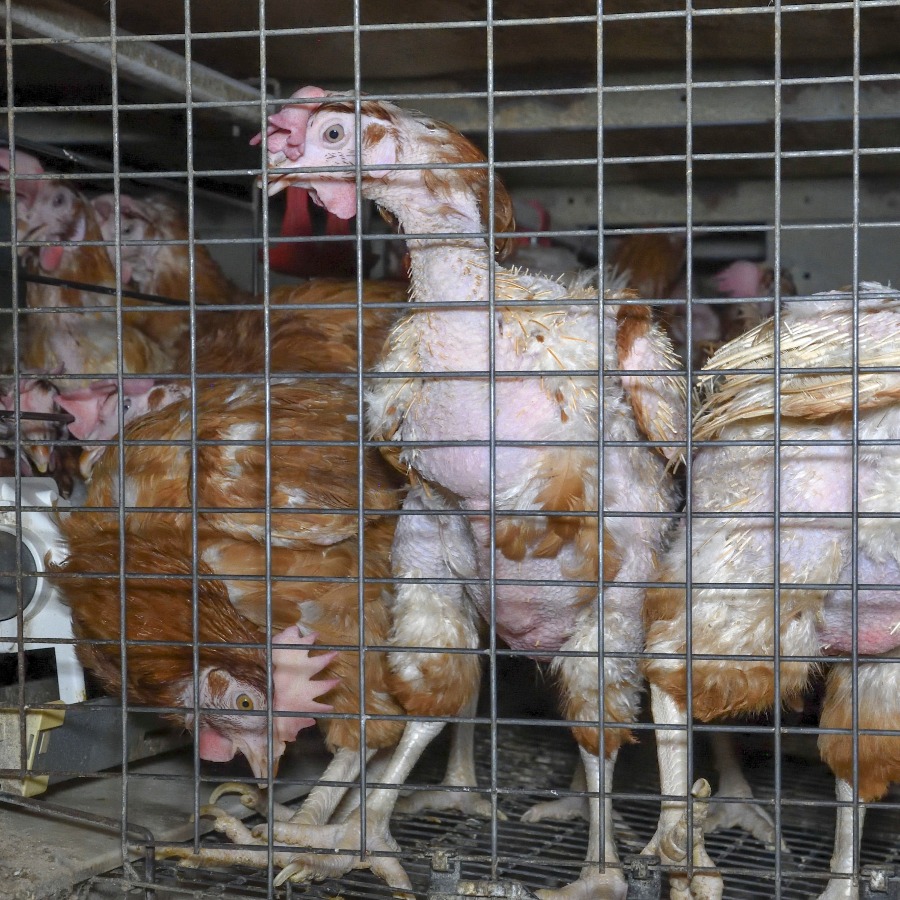



Factory farming in the UK: living conditions
The vast majority of farmed animals in the UK are factory farmed. There are almost 300,000 farms in the UK. Among them, over one thousand are ‘megafarms’ – US-style farms that house more than 125,000 birds reared for their meat, or 82,000 hens used for their eggs, 2,500 pigs reared for their meat, 700 cows used for their milk or 1,000 cows reared for their meat.
Over 1.2 billion land animals are slaughtered in the UK each year. This number does not include farmed and wild aquatic animals. If they were, the number of animals killed would increase to somewhere in the region of 6.4 billion, according to conservative estimates.
Despite this huge number, most of these animals are nowhere to be seen. They are kept indoors, inside farms with no windows and no indication as to what goes on inside their walls.
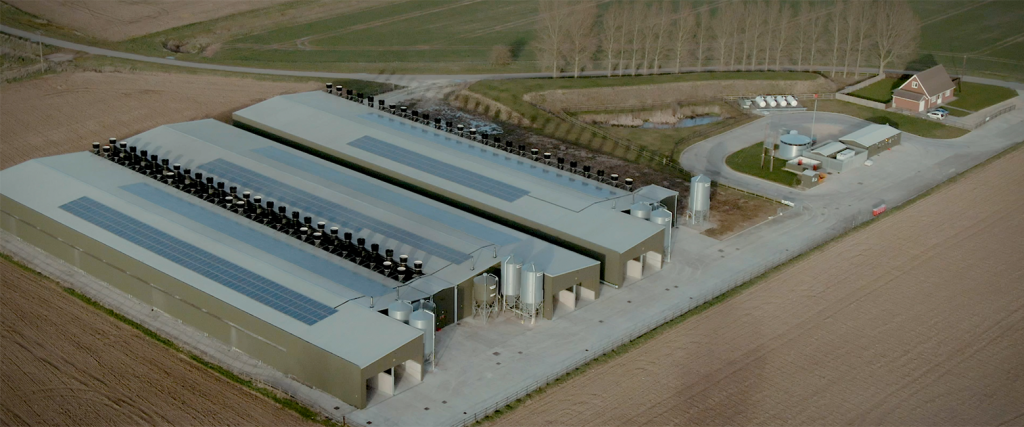
Factory farmed chickens & hens
Chickens reared for their meat
Chickens are the most abused land animal on the planet. In the UK, more than one billion chickens are killed every year for their flesh.
They are bred to grow so big and so fast that their legs and organs can’t keep up, causing them to suffer from heart attacks, organ failure and debilitating leg deformities. Those that survive this miserable existence are typically slaughtered at approximately 42 days old.
Chickens are killed using electrical waterbaths or gas. For an electrical waterbath stunning, chickens are hung upside down by their legs onto a moving conveyor, which carries them to a ‘waterbath’, where their heads swing into the electrified water. This process is extremely stressful and painful for chickens and is used to either stun or stun and kill them. Their throats are then slit after they exit the water bath.
Chickens are intelligent beings capable of feeling fear and pain. Like other animals, including humans, they want to live. This desire for life is the reason why many birds lift their heads during the stunning process to avoid the electrified water and are therefore slaughtered while still conscious.
To date, we have investigated 19 UK chicken farms linked to major supermarkets – including Tesco and Asda – and major fast food chains, like Nando’s and McDonald’s. Our investigators have documented workers deliberately kicking and stepping on birds, crushing the necks of those deemed too weak or too small to be profitable, and leaving some to deliberately dehydrate.
Hens used for their eggs
Every year in the UK, over 40 million hens are exploited for their eggs.
Hens are selectively bred to produce the maximum number of eggs. They often spend between 18-24 months packed in cages with up to 90 other birds.
The cages are so small and crowded that hens cannot even spread their wings or exhibit other natural behaviours. On average, each hen has around as much living space as a standard piece of A4 paper. Because of the living conditions, hens often die in their cages and are left to rot in the same space alongside living birds.
But that’s not all they have to endure.
Because of the stressful living conditions, hens often become aggressive toward each other. But instead of allowing them more space, the industry solves the problem by cutting their beaks. The process is referred to as ‘beak conditioning’ in an attempt to make it sounds less horrible than it is.
The UK egg industry is also responsible for the killing of 40-45 million male chicks per year. In fact, as male chicks are unable to produce eggs, they are deemed useless by the industry and discarded.
Animal Equality has investigated caged-egg farms in the UK which use ‘enriched’ cages. In 2020, Animal Equality investigated an egg farm in West Sussex and found many of the hens were suffering from severe feather loss and were completely bald with raw skin. Others didn’t survive and their bodies were left to decay in cages alongside living hens.
Factory farmed cows
Cows in the Dairy industry
Every year, around 1.8 million cows are exploited for their milk in the UK.
They are kept indoors and forced into a life of misery spent walking back and forth to the milking stations where they are attached to milking machines that take the milk intended for their calves.
Because of the growing industrialisation of farms in the UK, many facilities are adopting a zero-graze system, where cows are not allowed to step foot on the grass, ever.
But that’s not all. Because of the unnatural living conditions, approximately 30% of cows in the dairy industry become lame and many suffer from mastitis, an infection of the udder.
Cows are extremely maternal and social animals who can naturally live up to 20 years. However, on dairy farms, a cow is slaughtered when she is around three or four years old and sold for cheap meat or leather products.
Animal Equality has investigated four dairy farms in the UK, exposing the truth about the dairy industry to the world. Our latest exposé inside a Welsh dairy farm aired on BBC Panorama and showed acts of unspeakable abuses and violence, where cows were kicked in the stomach and punched in the face.
Factory Farmed Pigs
Over 10 million pigs are slaughtered each year in the UK alone. Most of them are factory farmed, with more than 60% of mother pigs and almost all pigs kept indoors in concrete or slatted floor pens, where they have a measly one square metre of space each.
Pigs in factory farms are not able to fulfil their basic needs and instincts. Mother pigs are confined in ‘farrowing crates’ for weeks on end where they are unable to move or turn around, let alone care for their babies. Because of the extremely limited space they are allowed, piglets become bored and stressed, causing many to painfully bite their brothers and sisters and sometimes even turn to cannibalism. For this reason, farmers often cut piglets’ tails and clip their teeth, without giving them any painkillers.
Routine tail docking or teeth clipping are not permitted under UK law, permitted only with the approval of a veterinarian, yet these processes are carried out regularly on farms.
The conditions on certified farms are hardly better. Over the years, we have exposed several ‘quality assured’ pig farms. Each time, we have uncovered instances of both legal and illegal animal abuse. During six visits to Cross Farm in Devon between 2023 and 2024, we collected over 100 hours of footage revealing pigs enduring unimaginable suffering.
Among the tragic scenes documented are:
- Piglets being ‘thumped’ and killed against concrete walls;
- Piglets having their tails cut off and teeth ‘clipped’ without anaesthetic;
- A piglet being thrown across the shed by workers; and
- A bin full of dead piglets and rotting corpses on the barn floor
Cross farm is a repeat offender. Our initial visit to this farm in 2017 revealed pigs enduring similarly deplorable conditions with individuals found in leaking, dilapidated buildings and lying in their own waste. The fact that nothing has changed since then is abominable and is proof that certification schemes cannot be trusted.
Our investigations provide evidence that the current system is failing animals. With increased inspections in place, we can witness and document the treatment of these animals, and hold animal abusers to account.
Join us in urging the Government to put in place stricter, more regular inspections inside farms and slaughterhouses.
Aquaculture: farmed fish
In the UK, up to 77 million fish are farmed and killed each year. That’s approximately 8,760 per hour.
Despite clear scientific evidence that fish feel pain, they still lack the same legal protections as farmed land animals (which are already woefully inadequate and poorly enforced).
Under the Animal Welfare Act (2006), fish are protected against ‘unnecessary suffering’ and farmers are required to meet their ‘needs’ just like other farmed animals. However, although fish are included under general provisions of the The Welfare of Farmed Animals at the Time of Killing (WATOK) Regulations, there are gaps in law meaning fish aren’t afforded species-specific regulations at the time of slaughter. As a result, there are currently no specific requirements as to how they should be handled or killed, leaving millions of fish to endure extreme suffering every year in their final moments of life.
At Animal Equality, we have seen this suffering first hand. Our investigations and exposés have revealed shocking animal abuse taking place across the fish farming industry. In 2021, we exposed suffering at a Scottish salmon slaughterhouse where salmon were conscious during killing. In 2023, we uncovered further cruelty on slaughter boats, where fish were violently thrown, inadequately stunned, and slammed against walls. Fish expert Mark Borthwick described this footage as some of the worst fish abuse he had ever seen.
In 2024, we continued documenting disturbing scenes, including salmon being beaten, suffocating to death, and dunked into a bucket of anaesthetic head-first while alive. These horrors far exceed even basic guidelines.
Enough is enough. Fish feel pain, and just like other farmed animals they deserve protection from cruelty. We are calling on the Government to implement a roadmap for meaningful legal protections for fish and to halt all new fish farms from being constructed, using our footage to leverage public support and demand change.
Factory farming in the UK: regulations
Current regulations
In the UK, the main law relating to animal welfare is the Animal Welfare Act (2006), which applies to all vertebrate animals (any animal with a backbone). The Animal Welfare Act defines the conditions animals should be kept in, as well as the consequences in law for those who fail to abide by the rules.
Among other things, the Act states that animals should be kept in a ‘suitable environment where they can express natural behaviours and that they should be caused no unnecessary suffering’.
Because of the way it is designed, factory farming often contradicts this principle, as the animals have very little space to carry out their most natural behaviours.
Mother pigs are kept in cages for weeks on end, unable to turn around or nurse their young. Their piglets will often have their teeth clipped and tails chopped off, without anaesthetic, to prevent them from biting each other – a stress-induced behaviour that comes as a result of the overcrowded and unnatural conditions in which they are forced to live. And the space given to each chicken raised for their meat is around the size of an A4 sheet of paper, meaning they can barely flap their wings or dust bathe.
In addition to the Animal Welfare Act (2006), farmed animals are also protected by The Welfare of Farmed Animals (England) Regulations (2007). These regulations provide minimum standards specific for each farmed animal species.
But for laws to be effective, they must be applied and followed. Unfortunately, as our investigations have shown time and again, this is too often not the case on farms and in slaughterhouses.
Enforcement
For any policies or welfare standards to have a direct effect on the lives of animals, appropriate enforcement measures need to be in place. The laws must be monitored and, where illegality is discovered, those involved must be held accountable.
Without proper enforcement, vulnerable animals are left even more vulnerable and the animal agriculture industry is given even greater power and autonomy, knowing that laws can be broken with few consequences.
In the UK there are several regulatory bodies responsible for ensuring that the laws in place to protect farmed animals are being followed. With over 180 bodies involved, it is a fragmented and complex system.
When laws are violated, local authorities are responsible for initiating formal enforcement action, which may or may not lead to prosecution.
Animal Equality’s findings
Animal Equality has investigated around 50 facilities in the UK and found illegality, extreme suffering or deliberate cruelty in each and every one of them.
When there are laws in place to protect farmed animals, we must demand that the relevant authorities ensure that these laws are enforced. We cannot rely solely on animal protection organisations to bring to light violations and illegalities.
For this reason, we are now calling for stricter and more regular inspections to be put in place, and urging the Government to put in place a licensing system. This would mean that all farms and slaughterhouses would have to pay to be registered, be subject to more frequent and more unannounced inspections, and if they fail to pass those inspections they would face the prospect of losing their licence to operate.
A system like this already exists for zoos and breeding facilities. It is time to apply to the industry that rears and kills the greatest number of animals in the entire world.
We must fight for the animals trapped in this cruel system. By pushing for laws to be complied with, we are pushing to ensure that pigs no longer routinely have their tails painfully cut off, chicks are no longer forced to sit on their own urine and develop raw body burns, and hens will no longer be crammed into cages with up to 90 other hens.
We’ve so far gathered thousands of signatures. Help us reach even more by adding your name and speaking up for animals today!
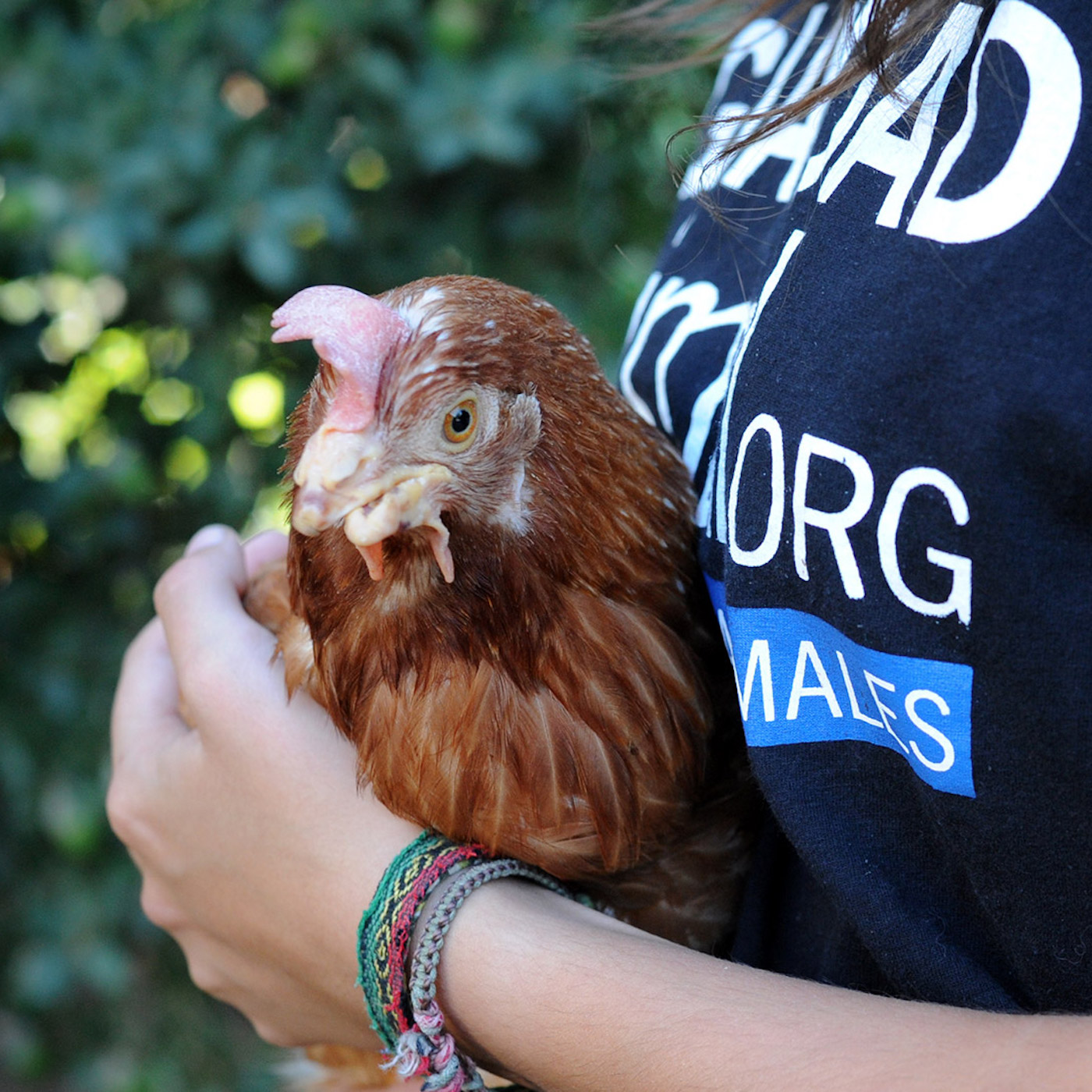
save animals, eat plant based
As a consumer, you hold the power to protect animals from the meat industry. Every plant-based meal saves animals from a life of misery in factory farms and slaughterhouses.
Recommended
